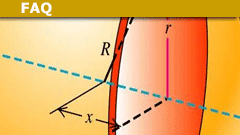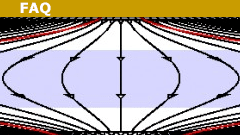
What Are Tensors and Why Are They Used in Relativity?
/
0 Comments
If you try learning general relativity, and sometimes special relativity, on your own, you will undoubtedly run into tensors. This article will outline…

Is there Evidence for the Big Bang?
Big Bang Key PointsHubble's law (redshift of galaxies) and the Doppler effect provide direct evidence for the universe expanding away from our reference…

Why We Don’t Discuss Perpetual Motion Machines (PMM)
Authorship Contributions From AnorlundaYou may want to believe the article you read, or the video you saw, or you may be very proud of your PMM invention.…

What Are the Thermodynamics of Black Holes? A 5 Minute Introduction
Definition/Summary
The four laws of black hole thermodynamics are as follows...The Zeroth Law
Surface gravity [itex](\kappa)[/itex] is constant…

What is Impedance? A 5 Minute Introduction
Definition/Summary
The impedance of a load (a combination of components) in an AC current is a complex number [itex]Z\ =\ R+jX[/itex] where [itex]R[/itex]…

What is Mass Inflation? A 5 Minute Introduction
Definition/Summary
Abstract from Poisson and Israel's 1990 paper, 'Internal structure of black holes'-'The gravitational effects associated with the…

What is Potential Energy? A 5 Minute Introduction
Definition/Summary
Potential energy is simply another name for (minus) the work done by a conservative force.Since the work-energy theorem states…

What is the Moment of Inertia? A 10 Minute Introduction
Definition/Summary
The moment of Inertia is a property of rigid bodies.It relates rotational force (torque) to rotational acceleration in the same…

What is the Double Slit? A 5 Minute Introduction
Definition/Summary
The double-slit is a simple configuration used to demonstrate interference effects in waves.Equations
At distances that are…

What are Virtual Particles? A 10 Minute Introduction
Definition/Summary
Virtual particles are a mathematical device used in perturbation expansions of the S-operator (transition matrix) of interaction in…

Lenses and Pinholes: What Does “In Focus” Mean?
In introductory physics, the optics unit often teaches about virtual and real images, focal lengths, indexes of refraction, etc. Some questions that are…

Where Did the Big Bang Happen?
According to standard cosmological models, which are based on general relativity and are found to agree well with observations, time and space did not…

Why Won’t You Look at My New Theory?
In any forum where science is discussed, there will always be people who have a great new personal theory and can't understand why no one else is interested…

At What Velocity Does the Universe Expand and Can It Be Faster than Light?
Neither of these questions makes sense in the form in which it was posed. To see why, let's start by thinking about how we know the universe is expanding.The…

Could Redshifts Be Intrinsic Rather than Cosmological?
How do we know that the redshifts of galaxies and quasars are cosmological and not "intrinsic?"
Evidence for the cosmological interpretation
The purpose…

Why Is the Speed of Light the Same in All Frames of Reference?
The first thing to worry about here is that when you ask someone for a satisfying answer to a "why" question, you have to define what you think would be…

Was the Early Universe in a Disordered State?
No. The second law of thermodynamics says that entropy can only increase, so if the early universe had been in a state of maximum entropy, then the cosmos…

Do Black Holes Really Exist?
Introduction
The purpose of this article is to discuss the title question from several different viewpoints, to show that it isn't as simple as it looks.…

Radius of the Observable Universe in Light-years Is Greater than Its Age
The radius of the observable universe is about 46 billion light-years, which is considerably greater than its age of about 14 billion years. The radius…

How to Build a Definition for Heat
One of the most frustrating misconceptions in Thermodynamics centers on the actual definition of heat. Many science/engineering students often refer to…

What Is the Steady-state Model and Why It’s No Longer Viable
Introduction to the Steady State Model
Back in 2011, I wrote a FAQ entry for Physics Forums on the steady state model and why it is no longer viable.…

Why Don’t Electrons Crash into the Nucleus in Atoms?
Atoms and Coulomb Forces
If one describes atoms using only the Coulomb forces, the electron and the nucleus will attract each other and no stable atoms…

How Does an Airplane Wing Work? A Primer on Lift
Many people ask how an airplane wing works, and several answers are commonly given. You might have even seen vigorous arguments between proponents…

Is the Universe a Black Hole?
In the early universe, the matter was gathered together at very high density, so why wasn't it a black hole?The first thing to understand is that the…

Learn About Energy Gained by Charge in an Electrostatic Field
I have seen this question being asked frequently on here. A lot of students have a bit of an issue in understanding why, if an electron is placed in a…

A Geometrical View of Time Dilation and the Twin Paradox
Based on the number of questions we receive on the topic at Physics Forums, there is a lot of confusion in the general public about how time dilation works…

Can We Tell Whether the Universe Is Rotating?
If you believe wholeheartedly in Mach's principle, then there is no way to test empirically for the rotation of the universe as a whole, since there is…

Does the Heisenberg Uncertainty Principle Imply Energy Nonconservation?
The short answer is: no, there's no violation.The longer answer can be this: Given the probabilistic aspect of quantum theory, what do we mean now,…

Do Photons Move Slower in a Solid Medium?
This question appears often because it has been shown that in a normal, dispersive solid such as glass, the speed of light is slower than it is in a vacuum.…

Can I Send a Signal Faster than Light by Pushing a Rigid Rod?
One common proposal for achieving faster-than-light communication is to use a long perfectly rigid object and mechanically send signals to the other end…

PF’s policy on Lorentz Ether Theory and Block Universe
What is the PF's policy on Lorentz Ether Theory and Block Universe?Debates about the superiority or "truth" of modern Lorentz Ether Theory (LET) and…

Does Gravity Gravitate?
The title question of this article is one that often comes up in PF threads, and I would like to give my take on it. This will be the first…

Why Is Acceleration Due to Gravity a Constant?
This question has popped up many times. So here is an attempt to address it.To answer this question at the elementary level, several assumptions will…

Why Does C Have a Particular Value, and Can It Change?
Short answer:
Because c (speed of light) has units, its value is what it is only because of our choice of units, and there is no meaningful way to test…

How Fast Do Changes in the Gravitational Field Propagate?
General relativity predicts that disturbances in the gravitational field propagate as gravitational waves, and that low-amplitude gravitational waves travel…

Will All Matter Be Converted to Photons?
Will all matter be converted into black holes and then photons?
No. There is a misconception that a lot of laypeople seem to be picking up recently from…

Do Photons have Mass?
Do photons have mass?
The quick answer: NOHowever, this is where it gets a bit confusing for most people. This is because, in physics, there are several…

What Is the Bell Spaceship Paradox, and How Is It Resolved?
Bell describes two spaceships that start out at rest relative to each other, with an elastic string between them, one end attached to each ship, which…

Why You Can’t Quantum Tunnel Through a Wall
What is quantum tunneling?
Quantum tunneling is a phenomenon in quantum mechanics where particles exhibit the ability to pass through energy barriers…

What is relativistic mass and why it is not used much?
It happens that the term relativistic mass is used, in particular in the introductory text on special relativity. It should be noted that whether or not…

Top 7 Basic Space Law Questions Explored
*This Insight is intended to have a logical basis but not to be taken as purely factual or legal advice.
Key PointsOuter Space Treaty does not…
